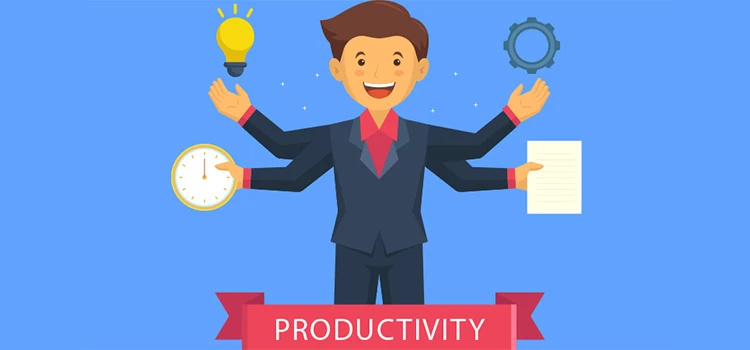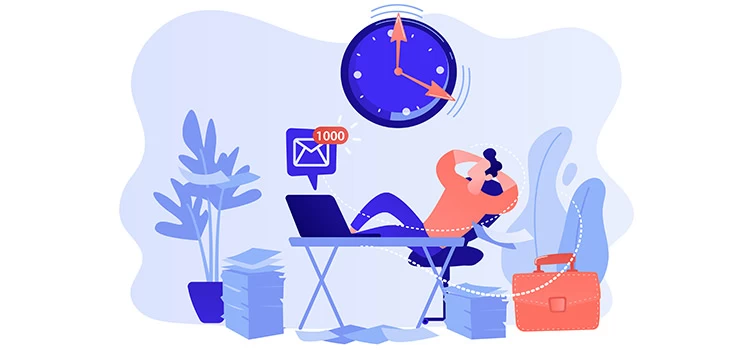Personal Development
How to be More Productive – 20 Tips to Work Productively
You’ve probably spent years developing your working habits, both good and bad, knowingly or unknowingly, and those won’t change overnight.
More long-lasting changes can start with little changes, but they may need patience. When reading a productivity article like this one, it seems to be quite simple. Though it isn’t. I’m not writing this from the viewpoint of an expert, but rather from that of a partner in the battle against pressure. So, despite the difficulties, show kindness and patience, and then try again.
Take a look at this article which will help you learn how to be more productive with useful tips and tricks for better time management.
 Are you looking for a Productivity Mindset Online Course?
Are you looking for a Productivity Mindset Online Course?
Table of Content
- What is Productivity?
- Why it is Important?
- 20 Tips to be More Productive
- 1. Develop a suitable to-do list
- 2. Set small goals for the tasks
- 3. Focus on one goal at a time
- 4. Do the hardest thing first
- 5. Stop multitasking
- 6. Take a break
- 7. Find a technique for assigning tasks and tracking performance
- 8. Pick on one task, then complete it
- 9. Try using the “2 pizza rule” in meetings.
- 10. Group similar tasks together
- 11. Remove waste by throwing things away
- 12. Spend some time walking or exercising
- 13. See what’s working
- 14. Be responsible to another person
- 15. Ask for help on stuff you don’t understand
- 16. Get sunlight
- 17. Look at images of cute animals
- 18. The five-minute rule
- 19. Time blocking
- 20. Find your most productive times
- Bad Effects of Being Less Productive
- FAQ
- Conclusion
- What to Read Next:
What is Productivity?
Productivity is a philosophy of life, a state of mind. Productivity is a way of thinking and a condition of being. Being productive involves behaving in every situation as we actively choose to and not as we feel pressured to by different factors. Being productive needs developing a mindset of ongoing growth.
Why it is Important?
This may seem to be a simple question to answer, but why are so many people focused on being productive?
Simply put, being productive is important because you can achieve more. A productive person may achieve more in less time. You will also have more time to engage in activities you enjoy, such as hobbies or hanging out with friends.
The feeling of accomplishment is another advantage of productivity. Dopamine, a natural mood booster, is released in your body when you cross something off your to-do list. Every time you complete something off your list, your mood improves.
Check out this blog to understand how you can stop being lazy.

Minimalist Lifestyle Course Online
- Accredited Courses
- Tutor Support Included
- 3 Installment Plan at checkout
- 14 Days Money Back Guarantee
20 Tips to be More Productive
Many people have a common question regarding how to be more motivated and productive. The answer is simple. You can improve your motivation and productivity by reading every day, setting small goals, and avoiding things that don’t matter.
So now let’s dive into our tips on How to be more productive! Here we go:
1. Develop a suitable to-do list
To-do lists usually fail because we complicate them or add activities that aren’t equally important. Others won’t require any time at all, some tasks will take a long time. As a result, there is a mismatch in how we spend our time. The result is that our to-do list turns into a means of avoidance. Yes, that is true because when we accomplish simple things, we become really confused while doing difficult things.
Don’t lie; you’ve done that before. So then, you need to manage your to-do list better.
2. Set small goals for the tasks
The scope of each new project or assignment may seem too large. But as soon as you start researching it and understand what can be done, you’ll see how each part builds upon the other.
Your project can be divided into more reasonable goals, which is one of the easiest and most useful things you can do.
- What pieces and assets are required?
- Who do you need to talk to first?
Before setting deadlines, break down the most important information, and then predict how long it will take you to complete each task.
You will be able to understand what is being asked if you realize the scope of the need, put the necessary steps into place, and then calculate the time required. Sometimes a project that seems large won’t take very long.
3. Focus on one goal at a time
As we just discussed, you should develop the practice of setting small goals for tasks. The project outline in the section above should have helped you identify the most crucial tasks, but how does your company decide what’s crucial?
The final decision will be made by your team, however, you can monitor OKRs, KPIs, and other measures to show productivity. It is up to you to carry out whatever the top priority of your organization is. Check out the 90-90-1 rule. It also applies to leading a team.
4. Do the hardest thing first
It can be tempting to avoid difficult tasks and focus on quick results. However, you can improve your drive and focus for the rest of the day by completing your most difficult tasks first.
5. Stop multitasking
While we’re talking about focusing on one activity or objective at a time, let’s also discuss multitasking. Even though it’s simple to become confused and attempt to multitask, doing this really reduces your productivity.
We are getting increasingly tired and working less effectively because of the continual job switching. Switching and changing that frequently requires a lot of brain power. When Slack, Skype, and Salesforce are all competing for our attention, the modern workplace environment won’t help you in your effort to be more focused.
6. Take a break
It can seem strange to advise taking breaks when discussing how to be productive at work, but taking regular breaks really lowers stress and increases productivity. Many workplaces require that workers take regular breaks. But if you work from home or in an unmonitored office, you may want to schedule short breaks every few minutes for 10–15 minutes.
7. Find a technique for assigning tasks and tracking performance
Giving your employees assignments and projects is one thing; seeing to it that they are completed and delivered is quite another. Then you have to deal with another element of the puzzle, which is sending it for approval.
Your work will be more productive if you can find a dependable way to monitor the tasks your team is working on. Workzone and other project management tools can help with this. But you also have a personal role to play in this. Your coworkers’ ability to stay on task will increase as a result of your regular updates and follow-up with the next steps.
8. Pick on one task, then complete it
This is very challenging because sometimes our projects take longer than 30 or 60 minutes. It can take eight hours or many days. Then, what is the answer? Make a single task out of it, and carry out that single assignment completely. How long should that last though? What is reasonable, too?
I believe that the majority of our days are divided into hours. which is actually between 45 and 50 minutes. We plan calls for an hour, lunch breaks, and meetings that begin on the hour. It makes sense to work steadily for 45 minutes on one item, yet it is extremely tough.
The Pomodoro technique offers 25-minute blocks of time, followed by the first 5-minute pauses and then larger breaks. Pomodoro helps you in removing interruptions and in understanding how long a particular work will take you.
9. Try using the “2 pizza rule” in meetings.
Meetings can definitely slow things down, especially if there are 30 people there to develop ideas. We are aware of how it works. People who talk constantly will continue to do so. The silent ones will continue to be silent.
It’s too huge if you need to order more than two pizzas to feed the group you’re meeting with. There won’t be enough conversation. There won’t be enough ideas presented. Instead, more creative ideas will surface if your team only involves people who would consume two pizzas. Not all people relate to greater ideas or quicker action. Things move much more slowly as a result.
10. Group similar tasks together
We always cause conflict when we switch between tasks. Starting and finishing. These many small distractions add up and break our focus. Then we get distracted and lose sight of the original purpose of our research. But grouping related jobs together is the best way to minimise moving between them.
Don’t just reply to one email before moving on. Don’t reply to any of them and don’t return for several hours. Respond to all of them and then don’t come back until several hours later.
Develop Your Team to Lead The Industry
Get fully accredited thousands of high quality online courses taught by the world’s leading experts suitable to companies of all sizes.
11. Remove waste by throwing things away
Did you realise that your work and productivity are affected by your physical environment? And by that, I don’t just mean whether or not you work in a “cool” office. That may be largely beyond your control depending on your organisation and your role there. However, you have control over your work area. When you don’t have to search and peck for whatever that missing thing is, you can be more productive.
12. Spend some time walking or exercising
I have worked from home, in urban business districts, and in-office parks. And I make it a point to take a walk at least once a day wherever I am. That is more refreshing than anything on social media, whether it be at the park, on the street, or near the parking lot.
This isn’t about maintaining a healthy weight or looking good, not that such things are bad. But because it improves your focus and ultimately makes you more productive.
13. See what’s working
When you are in charge of finishing many projects, you must take a step back to observe what is working and what isn’t, what needs to be pushed, and what has to be changed. Don’t waste time by planning review time, but instead improve your work going forward.
14. Be responsible to another person
This may seem clear to people who work in groups. Find a trustworthy person who will encourage you instead of criticizing you for failing. You require a motivator. It may be your boss, but chances are it’s a coworker who can keep you on track. Perhaps you can also help them.
15. Ask for help on stuff you don’t understand
If you’re arrogant (like I was!), you don’t like to ask for help with work you believe you should be able to complete on your own. For example, in my life, my tendency was to spend a lot of time attempting to format an Excel sheet or make the ideal Powerpoint presentation. Instead, smart people ask for help. Also, their friends consider them to be intelligent.
16. Get sunlight
This productivity advice is more important than ever in light of the recent change in which more workers are working remotely.
It goes without saying that working in an environment with enough natural light makes it easier for employees to learn, think creatively, and be productive. Researchers said that workplaces with enough sunlight always increase productivity.
17. Look at images of cute animals
You may find it hard to believe, but sharing and seeing images of adorable animals actually reduces attention spans and boosts productivity. You don’t trust me? This is cutting-edge science. If you disagree with this, your issue is with science in general (just kidding). However, a Japanese study actually evaluated performance after viewing adorable animals. They did, in fact, carry out this.
The study’s findings indicate that after viewing adorable pictures, participants carefully completed activities demanding focused attention.
Can you believe it? Here this will help you:
18. The five-minute rule
Try the five-minute rule to overcome your laziness. By promising yourself that you will just work on a task for five minutes, with this you will likely get rid of a lot of the excuses. Writing an email, finishing some paperwork, or creating a project plan, usually take five minutes only.
19. Time blocking
A popular method for increasing productivity is the use of time blocks. You can choose to intentionally set aside a “block” of time for a certain task by including time block frames in your workday calendar. Time blocks are usually divided into 60 or 90-minute sections.
20. Find your most productive times
While some workers do their best work in the morning, others find their best work comes after lunch. A great strategy to enhance productivity is to find out when you are most productive and then set up your daily schedule to take advantage of these peak hours.
Top Courses of this Category
Bad Effects of Being Less Productive
Some of the bad effects of being less productive are described below:
-
Disorganisation
Lack of organisation among employees who fail to finish their duties is caused by low productivity. Communication among the employees is hampered, and deadlines are missed.
-
Employee conflict
Employee conflict arises in low productivity situations. The employee will become angry, upset, and restless if their work is not finished on time.
-
High rates of employee turnover
Higher turnover rates are a result of low productivity. Soon or later the employee is going to leave the job.
-
Lack of flexibility
The strong presence of deadlines and tight schedules has a negative effect on employees’ minds, which results in low productivity.
-
Decline of business
The business will fail if the employees fail to achieve their goals quickly and successfully. It results in delays, lost business, and other problems like late services.
-
Stress
Employee stress and pressure will increase if there is low productivity at work.
-
Low motivation
The job satisfaction of employees is negatively impacted by low productivity.
FAQ
Why can’t I be productive?
Lack of direction leads productivity to stop for some people. Even if someone is aware of their goal, they may not know how to get there.
How can I be more productive in life?
You can become more productive in life by creating a to-do list, rewarding yourself with little rewards when major tasks are completed, and avoiding time-wasting activities.
How can I increase my productivity fast?
To increase your productivity fast you can take breaks, set small goals and take care of the biggest tasks when you’re most alert.
What is productivity anxiety?
It’s the feeling that you’re never making enough progress. You never truly feel happy with your achievements since there is always more to do.
How do you turn on a lazy day?
You can read an interesting book and do some gentle exercises which will help you turn on a lazy day.
What is the 80/20 rule for productivity?
The 80/20 rule means that 80% of effects result from 20% of causes.
How do I motivate myself to be productive?
You can motivate yourself by creating small goals, reading daily and celebrating wins.
Who is a productive person?
The most productive people are excellent problem-solvers. They complete work more effectively and come up with new solutions.
What is the two-minute rule?
The rule is simple: It shouldn’t take more than two minutes to begin a new habit.
How do I reset my brain to focus?
You can take a walk outside, drink some water, eat something healthy, and sleep to help your brain become more focused.
Conclusion
Highly productive people can look to be robots or magicians. Most of the time, the most productive people you meet have found ways to overcome difficulties like laziness.
Our productivity tips come down to four main things. Here’s how to be more productive:
- Proper time management
- Improve your to-do lists
- Look after yourself
- Be proactive
What to Read Next:
- How to Stop Being Lazy- Ultimate Guide
- How Old Do You Have to Be to Buy Paracetamol
- How to be Happier – 27 Ultimate Life Hacks
- How to Become a Chiropractor – A Definitive Guide
- The Ultimate Guide on How to be Healthy?
- How to be Taller – 20 Tips to be taller
- How to be Funnier – Top 19 Practical Tips












